If you’re searching for the 10 best self-discipline books that can truly transform your life, I’ve got you covered. These titles blend science-backed strategies, practical routines, and motivational stories to boost focus, build habits, and develop resilience. From understanding brain chemistry to adopting a growth mindset, each offers straightforward tools that make discipline feel achievable. Keep exploring, and you’ll discover how to turn this knowledge into lasting change that elevates every aspect of your life.
Key Takeaways
- They offer science-backed strategies that make building habits and self-control achievable and sustainable.
- These books provide practical tools like routines, journaling, and reflection to reinforce discipline daily.
- They focus on mindset shifts, such as growth mindset and resilience, to foster long-term behavioral change.
- Many include real-life examples and exercises to help readers implement discipline techniques effectively.
- They appeal to diverse audiences, from personal development seekers to those aiming for mental toughness and focus.
Self-Motivation Mindset Book: Achieve Unstoppable Drive
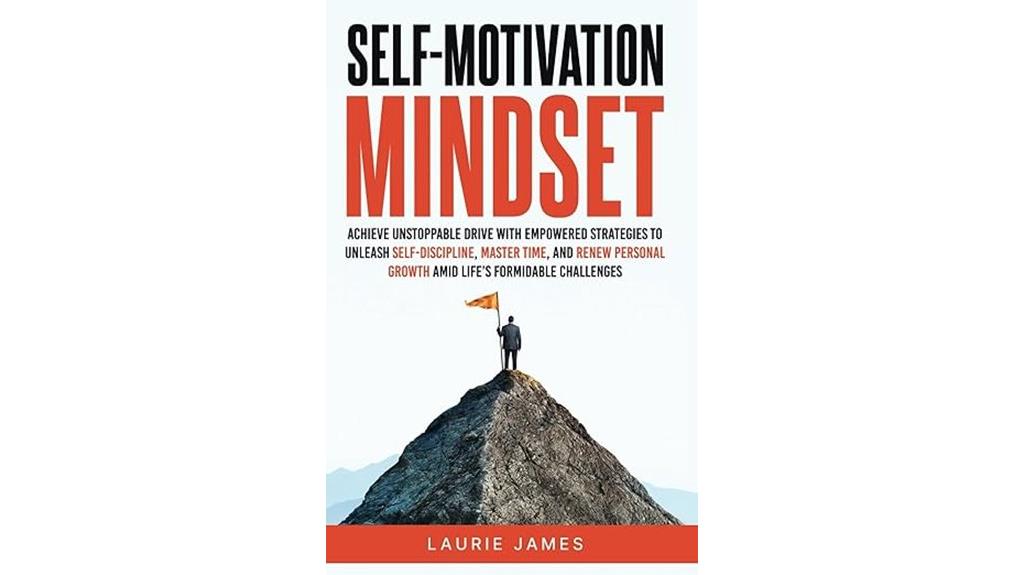
If you’re looking to develop a strong, unstoppable drive, the Self-Motivation Mindset Book is an excellent choice for anyone committed to personal growth. I’ve found that self-motivation isn’t an innate trait but a skill you can cultivate. The book emphasizes adopting a growth mindset—embracing challenges, learning from failures, and building resilience. It offers practical exercises like journaling and affirmations that help shift limiting beliefs and foster a proactive attitude. By applying these strategies, I’ve learned to stay motivated, overcome setbacks, and stay committed to my goals. It’s a powerful resource to turn motivation into a lifelong habit.
Best For: individuals seeking to build a resilient, proactive mindset and develop sustainable self-motivation skills for personal and professional growth.
Pros:
- Practical exercises like journaling and affirmations that effectively shift limiting beliefs
- Combines scientific research with relatable stories for easy understanding and application
- Concise format (around 160 pages) makes it accessible and easy to revisit for ongoing motivation
Cons:
- May require consistent effort and discipline to fully implement the strategies
- Some readers might find the quick-reference layout less suitable for in-depth study
- Lacks detailed step-by-step guidance for advanced habit formation or complex challenges
Discipline Equals Freedom: Field Manual Mk1-MOD1

Discipline Equals Freedom: Field Manual Mk1-MOD1 by Jocko Willink is an ideal choice for anyone who wants quick, no-nonsense motivation to build self-discipline. This compact, visually-driven book delivers 247 aphorisms, quotes, and practical advice designed for immediate impact. Its simple black-and-white design makes it easy to reference during moments of reflection or early mornings. Willink emphasizes discipline as a pathway to freedom, success, and fulfillment, blending military ethos with stoicism. The blunt, results-oriented approach encourages taking responsibility, establishing routines, and pushing beyond comfort zones. It’s perfect for those seeking straightforward guidance to develop mental toughness and consistency.
Best For: individuals seeking quick, practical motivation and discipline reinforcement to improve personal and professional discipline.
Pros:
- Concise and easy to reference, perfect for brief moments of reflection.
- Practical, results-oriented advice grounded in military discipline and stoicism.
- Visually driven design with clear, impactful aphorisms that boost motivation quickly.
Cons:
- Lacks in-depth philosophical exploration or detailed strategies.
- May be too blunt or straightforward for those preferring nuanced guidance.
- Not suitable as a comprehensive self-improvement program, better as a supplement.
The Science of Self-Discipline Book
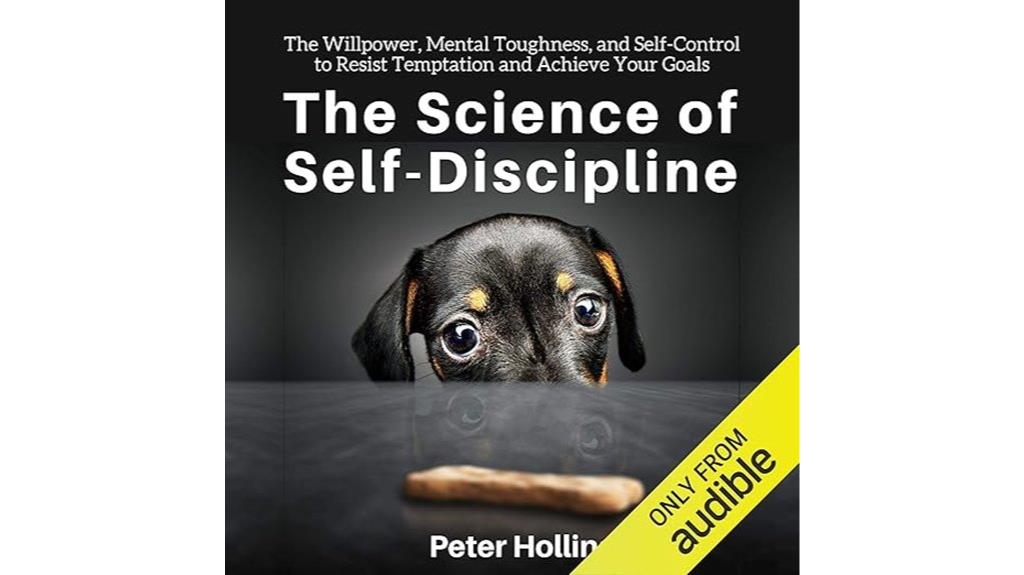
Are you seeking a scientifically grounded approach to building lasting self-control? “The Science of Self-Discipline” dives into how willpower, mental toughness, and habits shape our ability to resist temptation and stay focused. It explains how motivation is fleeting, but discipline becomes automatic through behavior change. The book emphasizes understanding brain chemistry—like dopamine control—and pushing past perceived limits with the 40% rule to boost resilience. Backed by research and practical techniques, it offers simple yet effective methods, such as habit formation and daily reflection, helping you develop discipline that sticks and transforms your life.
Best For: individuals seeking a scientifically-backed, practical guide to developing lasting self-discipline and improving focus, motivation, and resilience.
Pros:
- Provides evidence-based techniques grounded in research and science.
- Simplifies complex concepts with actionable strategies like habit formation and daily reflection.
- Emphasizes mental toughness and understanding brain chemistry to enhance discipline.
Cons:
- Some readers may find the minimalistic approach too brief or lacking in detailed exercises.
- The focus on discipline over motivation might be less inspiring for those looking for emotional encouragement.
- The cover design is modest, which may not appeal to everyone despite the valuable content.
Unbeatable Mind Book on Resiliency and Mental Toughness

When seeking to build resilience and mental toughness at an elite level, “Unbeatable Mind” stands out as a powerful resource, especially for those ready to challenge their limits and embrace a warrior mindset. This book offers practical routines to develop mental toughness and strategies for overcoming adversity, emphasizing the importance of embracing challenges and living purposefully. Drawing from the author’s Navy SEAL background, it shares inspiring stories and core principles like clarity of purpose and perseverance. While some examples focus on elite scenarios, the lessons are adaptable for everyday life. Ultimately, it’s a compelling guide to strengthening resilience and cultivating a resilient, focused mindset.
Best For: individuals seeking to develop resilience, mental toughness, and a warrior mindset to overcome challenges and achieve personal growth.
Pros:
- Offers practical routines and strategies grounded in military experience to build mental toughness.
- Inspires readers with powerful stories and core principles like purpose and perseverance.
- Adaptable lessons applicable to both elite scenarios and everyday life challenges.
Cons:
- Some examples and language may be complex or less relatable for beginners or non-elite audiences.
- Focus on military and high-performance scenarios might feel distant for average readers.
- The philosophical perspectives may not align with everyone’s beliefs, potentially requiring personal interpretation.
The Self-Discipline Lever Book
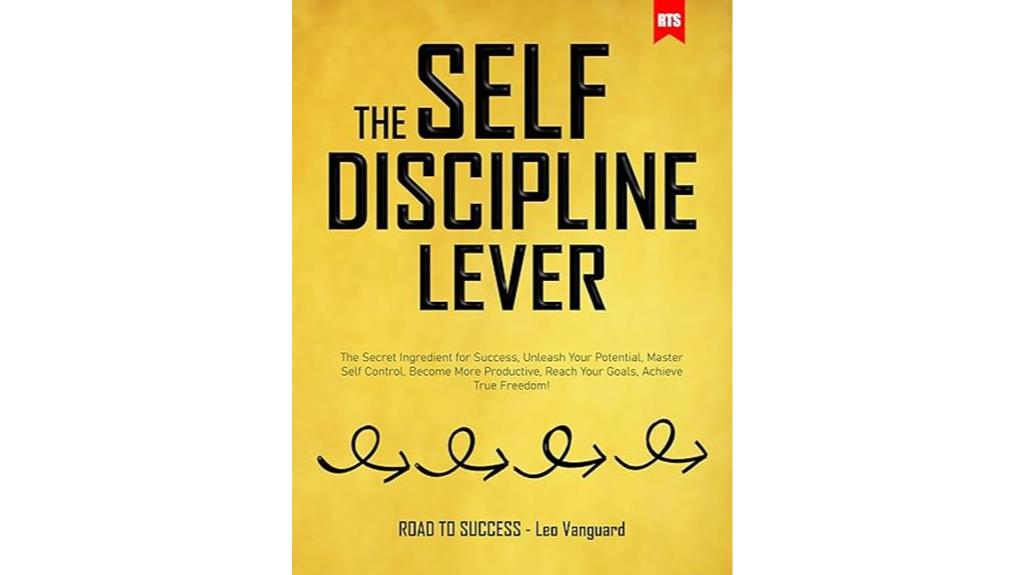
If you’re looking for a practical guide to strengthen your self-control and develop lasting habits, “The Self-Discipline Lever Book” offers valuable insights tailored for those committed to personal growth. It emphasizes understanding your core values, beliefs, and purpose as the foundation for building resilience and controlling emotions. The book provides actionable strategies like effective time management, goal setting, and distraction management. It encourages embracing discomfort, resisting impulses, and maintaining persistence through setbacks. With relatable stories and practical tips, it helps you develop habits aligned with your vision, fostering continuous growth and releasing your full potential through disciplined living.
Best For: individuals seeking practical guidance to enhance self-control, build lasting habits, and unlock their full potential through disciplined living.
Pros:
- Provides clear, actionable strategies for time management, goal setting, and distraction control.
- Uses relatable stories and practical tips to make complex self-discipline concepts accessible.
- Emphasizes personal growth through understanding core values and embracing discomfort for resilience.
Cons:
- Some readers may find the content repetitive or overly focused on motivation.
- The book can be considered overpriced by certain readers seeking concise guidance.
- It may require additional effort to apply the strategies consistently in daily life.
Neuro-Discipline Book: Neuroscience for Self-Discipline and Focus
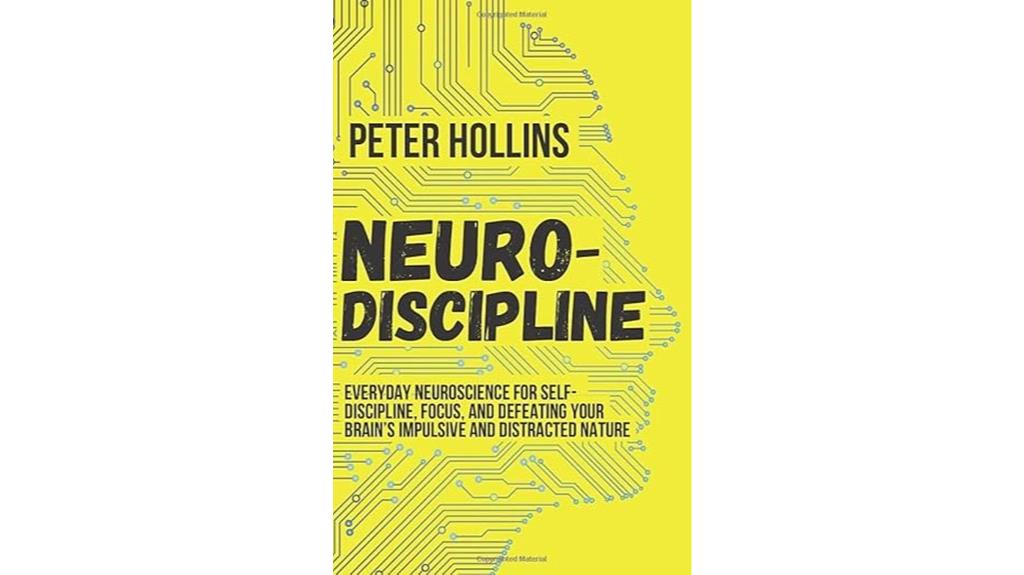
The Neuro-Discipline Book is an excellent choice for anyone interested in understanding how neuroscience can enhance self-control and focus. I found it straightforward and practical, offering science-backed tips that fit easily into daily routines. It explains how our brain’s tendencies toward distraction and impulsivity can be managed with simple, effective strategies. The book’s clear explanations and tools help boost self-awareness and behavioral change, making discipline feel achievable. Many readers, including myself, appreciate its no-nonsense advice and scientific approach, which makes building focus and self-control feel less intimidating. It’s a valuable resource for anyone seeking lasting personal growth through neuroscience.
Best For: individuals interested in applying neuroscience principles to improve self-control, focus, and habit formation through practical, science-based strategies.
Pros:
- Provides clear, scientifically grounded tips that are easy to incorporate into daily life.
- Enhances self-awareness and offers practical tools for behavioral change.
- Accessible and well-organized, making complex neuroscience concepts understandable for readers of all backgrounds.
Cons:
- May overuse trendy slang and casual language, which could affect its perceived professionalism.
- Some readers might find the style too simplified or informal, impacting its appeal across different cultures.
- Focuses primarily on practical advice, possibly lacking in-depth scientific detail for advanced neuroscience enthusiasts.
The Art of Self-Discipline: Practical Techniques to Boost Mental Toughness
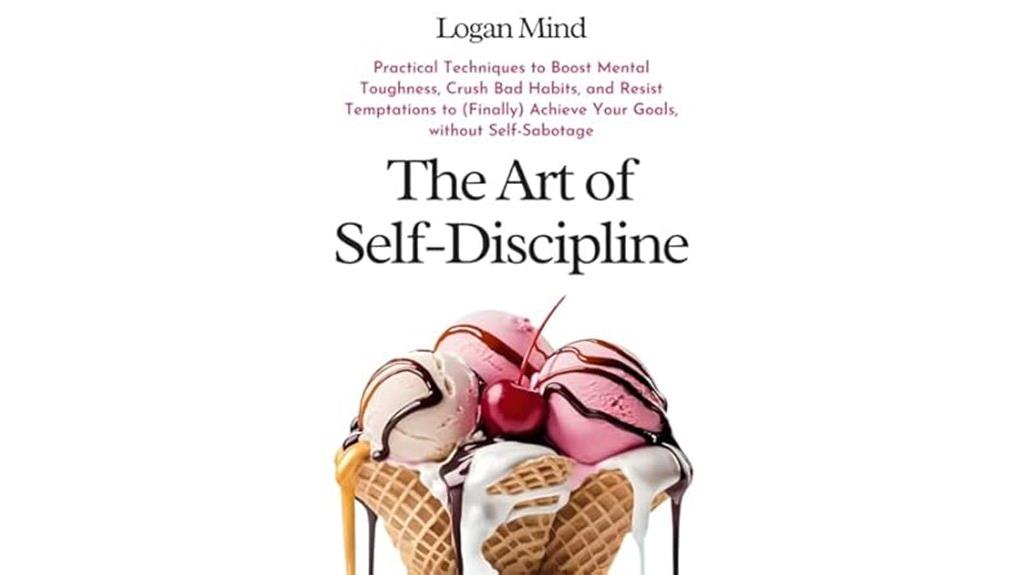
Anyone serious about building mental toughness and overcoming self-control struggles will find “The Art of Self-Discipline” an invaluable resource. This book offers practical techniques to strengthen your resilience, eliminate bad habits, and resist temptations. Its accessible, humorous style makes complex concepts easy to grasp, while providing actionable steps you can implement immediately. It emphasizes developing self-discipline as the key to achieving personal and professional goals. By applying its strategies, you’ll learn to replace destructive behaviors with positive actions, fostering lasting change. If you’re ready to boost your mental toughness and stay focused, this book delivers the tools you need to succeed.
Best For: individuals seeking practical, engaging strategies to enhance self-discipline, build mental toughness, and achieve long-term personal or professional goals.
Pros:
- Offers actionable techniques that can be implemented immediately for real results
- Uses an accessible and humorous style that makes complex concepts easy to understand
- Focuses on developing resilience and replacing bad habits with positive behaviors
Cons:
- May lack in-depth scientific explanations for some techniques
- Some readers might find the humor tone less serious or too informal for certain contexts
- Not a comprehensive psychological manual, so advanced mental health strategies are limited
Habits for Success: How to Change Your Life One Step at a Time

People looking for practical, easy-to-apply strategies to build better habits and boost self-discipline will find “Self-Discipline Books” especially valuable. Daniel Walter’s “Power of Self Discipline” offers simple, actionable advice that changed my perspective on success. The book emphasizes that small, consistent actions—like waking up early or showing up—can lead to big life changes. I appreciate how Walter shares personal stories and techniques for controlling impulses and reprogramming the mind. It’s inspiring without being overwhelming, making it easy to start small and build momentum. This book truly shows that success comes one step at a time, and habits are the key to lasting transformation.
Best For: individuals seeking practical, easy-to-implement strategies to develop better habits, increase self-discipline, and achieve lasting life improvements.
Pros:
- Offers simple, actionable advice rooted in real-life stories and techniques.
- Emphasizes small, consistent steps that lead to significant personal growth.
- Encourages re-reading and applying concepts for ongoing motivation and transformation.
Cons:
- The focus on small changes may seem too gradual for those looking for quick results.
- Some readers might find the lack of detailed step-by-step plans limiting.
- The book’s emphasis on discipline might not resonate with those preferring more flexible approaches.
No-Drama Discipline Book on Child Discipline

Parents seeking a compassionate, neuroscience-based approach to discipline will find *No-Drama Discipline* particularly valuable. This book emphasizes connection over punishment, helping you build strong, trusting relationships with your children. By understanding how their brains develop, you can guide behavior with empathy and patience, making discipline a supportive process. Many readers praise its practical advice, real-life examples, and clear explanations, which foster calmer homes and better self-regulation. The authors’ approach encourages teaching kids about actions and consequences through connection, not coercion—transforming challenging moments into opportunities for growth and understanding. It’s a must-have resource for nurturing healthier, more resilient children.
Best For: parents and caregivers seeking a compassionate, neuroscience-based approach to discipline that emphasizes connection and empathy.
Pros:
- Grounded in modern neuroscience, making complex concepts accessible and practical.
- Focuses on building strong, trusting relationships through intentionality and patience.
- Provides real-life examples and clear strategies that promote calmer homes and better self-regulation.
Cons:
- Some readers feel the emphasis on connection may underplay the importance of consequences or punishment.
- The approach may seem idealistic or challenging to implement consistently for some parents.
- Physical quality issues, such as thin pages and printing problems, can affect usability.
Build a Better Brain Book on Neuroplasticity and Mental Skills
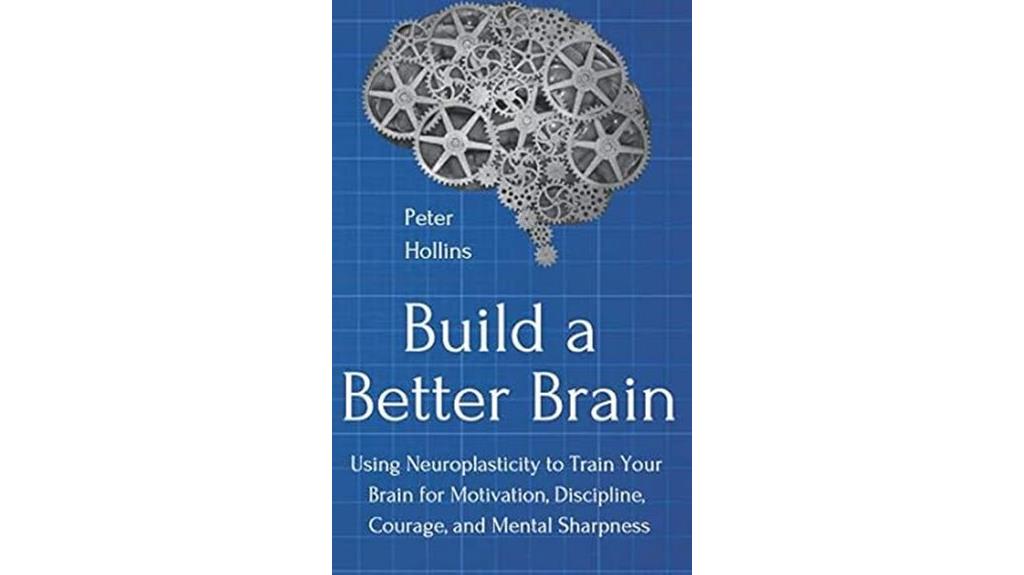
If you’re enthusiastic to strengthen your mental skills and open your brain’s full potential, the Build a Better Brain Book on Neuroplasticity and Mental Skills is an excellent resource. It explains how our brains can rewire and adapt throughout life, showing that change is possible with consistent effort. The book covers how habits form through neural pathways and offers practical techniques like CBT and the “if-then” method to break bad habits and build positive routines. Clear and accessible, it guides you in understanding your brain’s communication and reactions, empowering you to make lasting mental shifts and enhance your self-discipline.
Best For: individuals seeking practical, accessible guidance on enhancing mental skills, breaking bad habits, and understanding brain plasticity without prior neuroscience knowledge.
Pros:
- Clear and straightforward explanations make complex neuroscience concepts easy to grasp.
- Practical techniques like CBT and the “if-then” method are simple to implement for habit change.
- Short, engaging format offers quick insights and actionable advice suitable for all levels.
Cons:
- May lack in-depth scientific detail for those seeking advanced neuroscience knowledge.
- Some readers might prefer more extensive exercises or personalized coaching strategies.
- The concise nature might leave some readers wanting more comprehensive coverage of certain topics.
Factors to Consider When Choosing Self‑Discipline Books

When selecting self-discipline books, I focus on the author’s credibility and how well their expertise aligns with my goals. I also consider whether the book offers practical advice that I can apply immediately and if it’s written in a clear, engaging style. Ultimately, I check if the content is backed by scientific research and tailored to my experience level.
Author Credibility and Expertise
How can you determine if an author truly knows what they’re talking about when it comes to self-discipline? Start by examining their background and professional experience. Do they have credentials in psychology, neuroscience, or behavioral coaching? These fields lend credibility to their advice. Also, check if they’ve successfully applied their principles in real life or have published other reputable works. Endorsements or reviews from recognized experts or institutions can further validate their authority. Most importantly, see if their guidance is supported by scientific research or empirical evidence. An author with a strong, credible foundation demonstrates they genuinely understand the complexities of self-discipline and can offer reliable, effective advice. Trustworthy authors give you confidence in adopting their methods.
Practical Application Focus
Choosing the right self-discipline book means focusing on practical strategies you can apply right away. Look for titles that provide clear, actionable techniques you can implement immediately to strengthen discipline daily. Practical exercises like habit tracking, journaling, or reflection prompts help reinforce what you learn through experience. Books that offer step-by-step guidance or routines make it easier to translate concepts into tangible behaviors. Additionally, seek out resources that include real-life examples or case studies, demonstrating how discipline strategies work across different situations. Prioritize books that emphasize consistency and long-term habit formation, rather than quick fixes. This focus guarantees you develop sustainable habits that build discipline steadily and effectively over time.
Readability and Style
Selecting a self-discipline book that’s easy to read can make all the difference in how effectively you absorb and apply its lessons. I look for books with clear, concise language and an engaging style that keeps me interested. Whether I prefer humor, a formal tone, or straightforward advice, matching the author’s tone to my preferences helps me stay motivated. I also check if the book includes summaries, bullet points, or visual aids, which make quick reference easier. It’s important that the content balances scientific insights with practical tips presented accessibly. I often review sample pages or reader reviews to see if the style resonates with me and encourages consistent reading. Ultimately, a well-written book makes the journey toward better self-discipline more enjoyable and effective.
Scientific Backing
Opting for self-discipline books backed by scientific research guarantees I’m getting strategies rooted in proven principles rather than just anecdotal advice. I look for books that cite credible studies, include references, or explain the neuroscience behind motivation and self-control. Prioritizing works that incorporate psychological theories and empirical data helps me trust their techniques and claims. It’s important to verify that the author has a background in behavioral science, neuroscience, or psychology, ensuring credibility. I also stay cautious of books that rely heavily on pseudoscience, sensational claims, or lack transparency about their sources. Choosing scientifically grounded books means I’m more likely to adopt effective, evidence-based strategies that truly enhance my self-discipline and transform my life.
Target Audience Fit
How do you guarantee a self-discipline book truly meets your needs? First, consider whether it’s designed for beginners or advanced readers, ensuring it matches your current skill level. Think about your specific goals—do you want to build resilience, break habits, or boost mental toughness? The language and examples should resonate with your age, culture, and experiences for better engagement. Also, check if the book’s approach—scientific, practical, motivational, or philosophical—aligns with how you prefer to learn and stay motivated. Lastly, verify it’s tailored for your demographic, whether you’re a student, professional, athlete, or parent. Picking a book that fits these factors helps you stay motivated and makes the lessons more applicable to your life.
Content Depth and Length
When choosing a self-discipline book, understanding its content depth and length is crucial to guarantee it fits your learning style and schedule. Longer books often offer comprehensive insights and detailed techniques, but they require a bigger time commitment to read thoroughly. Shorter books or manuals are perfect for quick motivation and easy reference, making them ideal for busy schedules or immediate application. Content depth varies; some focus on scientific research and in-depth strategies, while others emphasize practical tips and simple exercises. Picking a book with the right length helps you engage without feeling overwhelmed or under-informed. Consider whether you prefer concise, actionable advice or more detailed explanations to ensure the material suits your needs and keeps you motivated to apply what you learn.
Motivation and Engagement
Ever wondered what makes a self-discipline book truly motivating and engaging? It’s the way stories and exercises connect with you personally, making the concepts easy to grasp and apply. Books that use compelling language, vivid imagery, and highlight clear benefits keep your interest alive and fuel your motivation. Interactive elements like reflection prompts or actionable steps reinforce learning and make the process feel practical. Scientific evidence and real-life examples help you see the tangible impact discipline can have, boosting your confidence and drive. Additionally, accessible writing—straightforward language and a motivating tone—makes it easier to stay engaged and committed over time. When a book balances these factors, it becomes a powerful tool to transform your self-discipline journey.
Frequently Asked Questions
How Do I Measure Progress in Self-Discipline?
Measuring progress in self-discipline can be tricky, but I find tracking my habits really helps. I set clear, achievable goals and keep a journal or use apps to monitor daily actions. When I notice consistent effort and small wins, I feel motivated. It’s about recognizing patterns over time, not perfection. Regularly reviewing my progress keeps me accountable and pushes me to stay disciplined, even when challenges arise.
Can Self-Discipline Be Developed at Any Age?
Think of self-discipline as a muscle—you can definitely strengthen it at any age. I’ve seen people transform their habits well into their senior years, proving it’s never too late. I believe that with consistent effort and the right mindset, self-discipline can blossom at any stage of life. So, no matter your age, you’re always capable of building better habits and becoming more focused.
What Are Common Obstacles to Maintaining Discipline?
When it comes to maintaining discipline, I find that common obstacles often include procrastination, lack of clear goals, and distractions. I struggle too, especially when I feel overwhelmed or bored. To stay on track, I remind myself of my reasons, set small achievable steps, and minimize temptations. Recognizing these hurdles helps me develop better habits, and I believe you can too if you stay committed and patient.
How Do I Stay Motivated During Setbacks?
Did you know that nearly 70% of people struggle to stay motivated after setbacks? I’ve been there too. When I face setbacks, I remind myself that progress isn’t linear—failure is part of growth. I break my goals into smaller tasks, celebrate small wins, and refocus on my “why.” This helps me regain momentum and stay motivated, even when things get tough. Keep pushing—you’re stronger than you think.
Are There Specific Habits That Enhance Self-Discipline?
You’re wondering if specific habits boost self-discipline, right? I’ve found that creating a morning routine, setting clear goals, and practicing mindfulness really help. I also stay accountable by tracking my progress daily. Small, consistent actions build momentum and make discipline easier over time. Incorporating these habits into your daily life can strengthen your self-control and keep you focused on your long-term goals.
Conclusion
If you’re ready to open your full potential, these books are the keys to your transformation. Think of self-discipline as a garden—you need to tend it daily to see the blooms. With each page, you’ll plant seeds of motivation, resilience, and habit. So, pick a book, start your journey, and watch as your life blossoms into the masterpiece you’ve always envisioned. Your future self will thank you for the effort you invest today.










